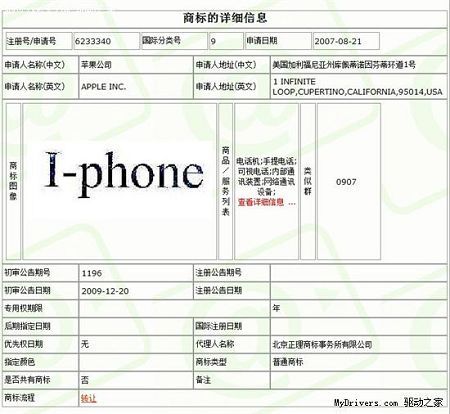Society
- Details
- By David Cao
- Hits: 661
A statement from the court said 34 alleged gang members headed by Gong Gangmo were charged in Chongqing with organized crime offences on November 20, 2009. On November 22 and 25, Gong's wife and cousin signed contracts with Beijing Kang Da Law Firm in Beijing. Then the law firm assigned Li Zhuang, together with Ma Xiaojun, to defend Gong.
On November 24 and 26 and December 4 when Li visited Gong in Jiangbei district detention house, Li urged Gong to reverse his former confession and to fabricate an accusation of torture by the police during interrogation.
Read more: Beijing lawyer gets 2.5-years jail time for falsifying evidence in gang trial
- Details
- By David Cao
- Hits: 839

Beijing company Hanwang Technology has transferred ownership of its "i-phone" trademark to Apple.
The news was released on Monday by PC World, a technology news website based in the United States, which reported that Apple had resolved its iPhone trademark conflict in China.
The website said an official at Hanwang had confirmed that the company had made a deal with Apple, but the official refused to give details, saying Apple was concerned that reports about the deal might affect its brand.
The official website of China's state trademark office showed that ownership of the trademark "i-phone" had indeed transferred from Hanwang to Apple on Monday.
A spokeswoman with Apple in Beijing yesterday declined to comment.
Neither companies have discussed how much money changed hands.
"Hanwang will have sold the trademark to Apple for several million dollars," said Wang Hao, a lawyer from BSFD Intellectual Property Agency in Beijing.
Read more: Chinese Hanwang transfer trademark " i-phone" to U.S. Apple
- Details
- By David Cao
- Hits: 740
The Chinese believe corruption is the biggest problem hurting the nation's image, a recent survey has found.
A poll conducted by the Horizon Research Consultancy Group showed nearly 60 percent of the respondents took corruption among government officials as the biggest blot on China's image, to be followed by counterfeit and shoddy goods, and pollution, the China Daily reported Wednesday.
Altogether 1,350 people in five major cities, including Beijing and Shanghai, joined the telephone survey in mid-December.
Read more: Chinese believe corruption biggest blot on nation's image: poll
- Details
- By David Cao
- Hits: 1346

News that the wife of Yao Ming, the Houston Rockets' All-Star center, is pregnant has sent netizens rushing to predict Baby Yao's height and gender in the hopes that the child will someday lead the national basketball team.
Zhang Chi, spokesman of the Shanghai Sharks, confirmed that Yao and Ye Li, a former player on the Chinese women's national basketball team, are expecting their first child. The Sharks were recently purchased by Yao.
"The couple appreciate the public's concerns (about the expected baby)," said Zhang. "But to give Ye some space and peace of mind, the couple thinks it's inconvenient to provide any further information."
A report on Sina.com said Ye, who is 1.90 m in height, is expected to give birth sometime around May or June. But whether Ye will deliver the baby in the United States or in Shanghai is unknown.
Read more: Chinese Netizens fuss over future height of 'Baby Yao Ming'
- Details
- By David Cao
- Hits: 748

People prepare materials for rescuing miners at the Lisheng Coal Mine in Tanjiashan Town of Xiangtan County, central-south China's Hunan Province, Jan. 5, 2010. Twenty-seven miners were trapped after a fire happened inside the coal mine on Jan. 5.
The death toll has climbed to 18 in Tuesday's coal mine fire in central China's Hunan Province, with nine more bodies retrieved early Wednesday.
Rescue work continued Wednesday to search for survivors, as at least nine more miners were believed to be trapped at the Lisheng Coal Mine in Tanjiashan Town of Xiangtan County.
More Articles …
Page 177 of 255